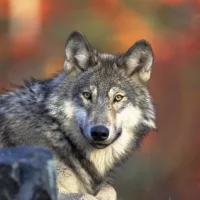
The Fish and Wildlife Commission held a workshop on Thursday, Dec. 14 to discuss the Department’s five-year review of the Wolf Plan and consider next steps.
At the meeting, the Commission determined that revision of the Wolf Plan was not needed at this time, while directing staff to focus on addressing key challenges including wolf-livestock conflict, reducing illegal take, and population monitoring.
ODFW policy directs that, “to the extent practicable, at least once every five years the department shall review the Plan and make recommendations to the Commission for any changes to the Plan.” The last review was initiated in 2016 and an updated Wolf Plan was adopted in 2019 after an extensive public process.
During the workshop, Commissioners first heard from the Department regarding its evaluation of the Wolf Plan and its implementation, including its relevancy and ability to address contemporary needs, meet objectives, and whether it contains the best available science to support decision-making.
Commissioners also heard input about the Wolf Plan and its implementation from invited panelists representing Western Environmental Law Center, Oregon Wild, Oregon Cattlemen’s Association, Oregon Hunters Association, Western Landowner Alliance, and Oregon State Police.
The review found that the Wolf Plan is sufficient to address contemporary needs and continue to successfully guide wolf conservation and management in Oregon. For many topics where success or full implementation has not yet been achieved, the Wolf Plan provides substantial flexibility to adapt to new or growing challenges. While there are areas where the Wolf Plan could be updated with new information learned since 2019, these updates would not meaningfully change implementation actions.
Commissioners agreed with this assessment.
“I think we can do the things we need to do without opening the Plan,” said Commissioner King, while calling for a less siloed approach between partners and more use of social science.
“We can achieve goals without opening the Plan as long as we work together,” said Commissioner Mark Labhart.
“I see only value in focusing on getting to work on those priorities mentioned today,” said Commissioner Becky Hatfield-Hyde.
“While I have some issues with the Plan, implementation issues are a big enough thing to bite off right now. If we are going to try to do one thing well, let’s do implementation,” said Commissioner Khalil.
Focus on wolf-livestock conflict, illegal take, population monitoring
Wolf-livestock conflict continues to be the most challenging and time-consuming aspect of implementing the Wolf Plan. Livestock producers who experience depredation face physical, emotional and financial burdens beyond the market value loss of the animal killed. Managing wolf-livestock conflict and reducing the burden on landowners and producers will be critical for the long-term conservation of wolves in Oregon.
During the meeting, ODFW staff reviewed process improvements they have implemented in recent months to better manage wolf-livestock conflict. Those include empowering field biologists to make determinations on the ground when there is sufficient information, clearer determination categories, streamlining the public notification process by moving to a weekly update and more quickly approving lethal control requests when nonlethal measures aren’t working.
In another improvement, USDA Wildlife Services is providing more assistance to Oregon wolf management by bringing in additional specialists focused on non-lethal resources to reduce wolf-livestock conflict, investigating depredations, and lethally removing wolves per Wolf Plan rules when authorized by the Department. More non-lethal resources to help with wolf-livestock conflict are on the way, including new federal funding for non-lethal conflict deterrents and increases in the state fund that compensates landowners for confirmed livestock losses and assists with non-lethal deterrents.
Finally, ODFW is working with the Western Landowners Alliance to better connect landowners with financial and technical resources and to better collaborate with livestock producers impacted by wolf-livestock conflict.
Illegal take of wolves was another high priority concern. Over a third of known wolf mortality in Oregon is caused by illegal take of wolves. Since wolves returned to Oregon in 2009, 30 have been shot, 16 poisoned and another five were suspected to be poisoned. “Illegal take is unacceptable and a conservation threat that we need to be concerned about,” said Roblyn Brown, ODFW Wolf Coordinator.
Also in coming years, ODFW will work towards developing methodology to estimate the wolf population that would allow the eventual transition away from conducting a minimum wolf count each year.
A recording of the meeting is available online at https://www.youtube.com/playlist?list=PLLleHsPDijGYdHenfzYZNBcYnIyIn3fDE















